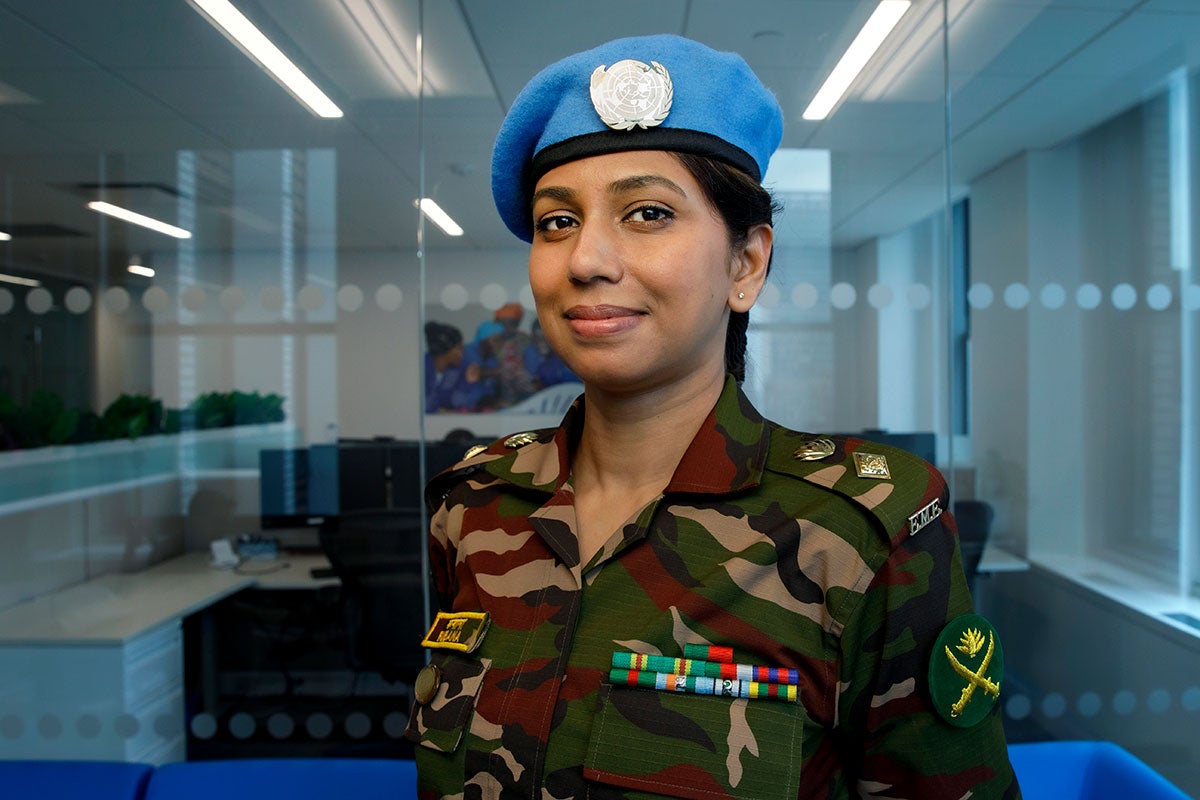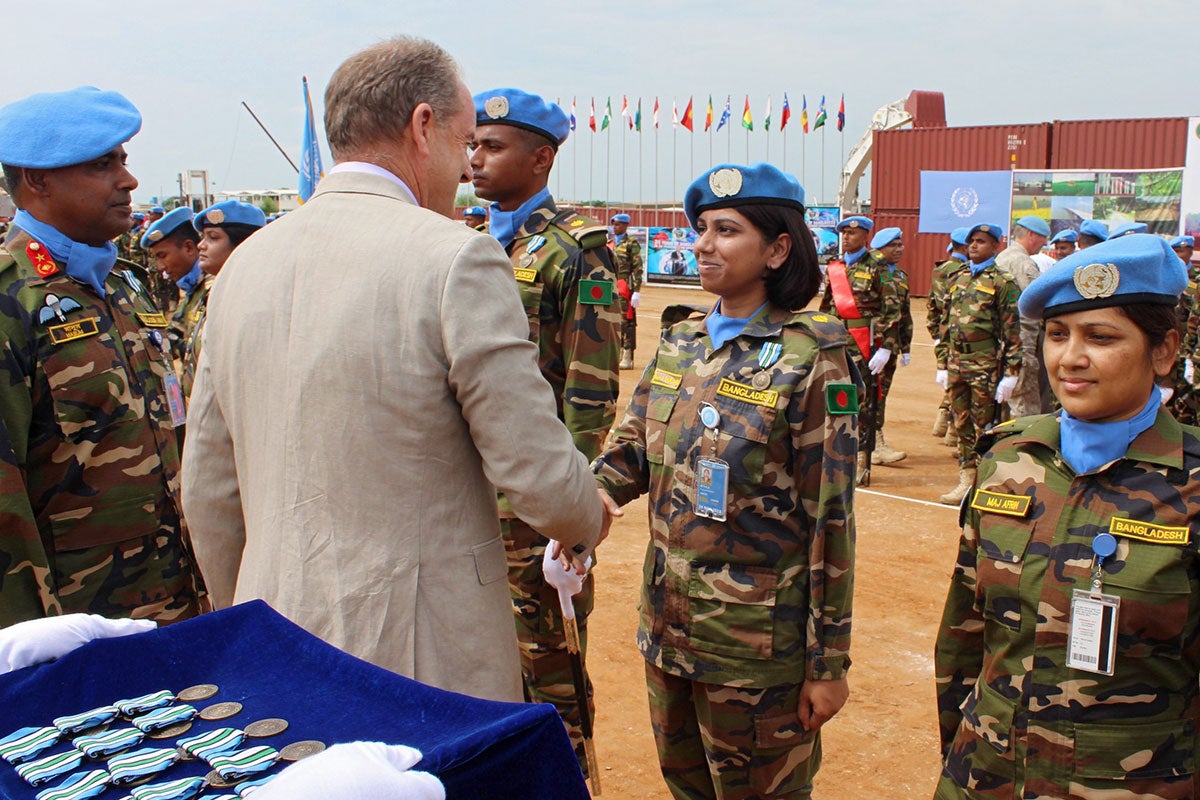‘Women peacekeepers are stronger than you think’ – Interview with Lieutenant Colonel Rubana Nowshin Mithila
As the United Nations prepares to mark the International Day of the UN Peacekeepers (29 May), paying tribute to the dedication and sacrifice made by peacekeepers around the world, UN Women spoke to Lieutenant Colonel Rubana Nowshin Mithila about her experience as a woman in peacekeeping.
Uniformed women – police and military – represent less than 10 per cent of the over 64,000 UN Peacekeeping personnel deployed today. UN Women, in collaboration with the Department of Peace Operations runs a training programme to prepare women military officers for peacekeeping operations. Lieutenant Colonel Mithila, who has served in the United Nations Operation in Côte d'Ivoire (UNOCI) and the United Nations Mission in South Sudan (UNMISS), completed the training in 2023.

Role of women in military and UN Peacekeeping
“I am part of the first generation of female military officers in Bangladesh,” says Lt. Colonel Rubana. She was preparing for her undergraduate studies in 2001, when she heard that the Bangladeshi army was accepting applications from female candidates for the military officer role. Lt. Colonel Rubana did not hesitate – she admired the army and was hungry for adventure and equal opportunities. Out of 13,000 applicants that year, she was among the 52 candidates selected for the training.
Lt. Colonel Rubana has served with UN Peacekeeping in Cote d’Ivoire and South Sudan. For her, women’s meaningful representation in peacekeeping is critical – “There is balance in everything in nature. Peacekeeping missions too need balanced representation. When women plan things, they see even the minor details, the small things. The men typically look at the big picture. When you combine both, you get the most workable plan.”
“The women peacekeepers are also more attuned to the special needs of the women and girls in the communities. The local women open up to them,” she added.
Women peacekeepers:
— UN Women (@UN_Women) May 27, 2024
🔵 Provide greater access to communities and survivors of violence
🔵 Serve as role models in post-conflict settings
This Day of UN Peacekeepers, Capt. Kuenzang Dema, a UN police officer, explains women's importance in peacekeeping.
#PKDay @unmissmedia pic.twitter.com/IzUUW1gcqc
Challenges and stereotypes faced by women in peacekeeping
Lt. Colonel Rubana had a supportive family who encouraged her to pursue a military career. However, after joining the military and UN Peacekeeping, she faced and witnessed some recurring challenges.
Getting leadership positions were not easy for female military officers, it was a slow process of breaking stereotypes and notions that men were naturally suited for leadership. “I had to prove that I could contribute to the decision-making processes and operations as well as a man,” shared Lt. Colonel Rubana. “I had to prove it more than a man had to.”
A common myth that she wants to bust is that women are less strong or capable than men: “Women peacekeepers are stronger than you think – mentally and physically. When they go for combat, they are fiercer than men.”
“There is also a misconception that when [women in military] work with men, they lose their feminine qualities. It’s not like that. Rather, you support each other, you grow more. The military becomes more sensitive and sympathetic to special situations like peacekeeping.”
Lt. Colonel Rubana also reflected on the challenge of gender-sensitive accommodations and how the lack of such facilities can become a barrier to deploying more women peacekeepers. Something as simple as creating enough privacy and having washrooms for women closer to their living quarters and away from men’s washrooms can make a big difference.
However, when peacekeepers need to deploy to remote locations, she recalled her superiors hesitating to take more women because they felt that would increase their logistical burden. “A battalion may also hesitate to engage the women peacekeepers in patrols because they think they need to be protected. That’s not true – we can take care of ourselves,” she stressed.
Supporting and incentivizing national police and armed forces to increase meaningful participation of women in peacekeeping is an important step towards meeting the UN targets on gender parity among uniformed personnel. Since 2019, the Elsie Initiative Fund, hosted by UN Women, has awarded over USD 17 million in grants to 20 projects to help countries recruit and deploy more women peacekeepers, construct gender-sensitive facilities, and improve deployment conditions.

Impact of women peacekeepers on local communities
“Local women open up more to women peacekeepers,” said Lt. Colonel Rubana. Her statement is backed by numerous reports showing that gender-responsive peacekeeping units build trust with the communities they serve and improve the effectiveness of peace operations.
Sometimes, women peacekeepers can get information that men cannot access. Lt. Colonel Rubana shared a story from the recent Women’s Military Peace Operations Course she attended.
“There was a Mongolian peacekeeper who told us the story of water pumps,” shared Lt. Colonel Rubana. “They built a water pump in a community so that the women didn’t have to travel too far to get water. But the pump was repeatedly destroyed or stop working within one month of construction. They rebuilt it many times, and finally, the Mongolian peacekeeper talked to the local women and discovered that the women did not want the water pump in that location. Going to fetch water to the original location was the only time that the women had, away from the men in their families. They considered it a respite and did not want to change their routine.”
If not for women peacekeepers, they would have never known why the location of the water pump didn’t work for the women in the community.
The three-week training programme by UN Women and the Training Service of the Department of Peace Operations provides in-depth and practical knowledge to better prepare women military officers for peacekeeping operations. For Lt. Colonel Rubana, the unique experiences and knowledge shared by women peacekeepers with one another was invaluable.
Women peacekeepers are also powerful role models to women and girls in the communities they serve. “When women and girls in the community see us, women peacekeepers, they feel inspired to rise for peace,” added Lt Colonel Rubana.
Message for the International Day of UN Peacekeepers
Lt. Colonel Rubana Nowshin Mithila has a message for women and girls aspiring to join peacekeeping: “Peace is for everyone; everyone, irrespective of gender, has to work for peace to make this world free of war and conflict.”









